Review of Breakheart Pass
Introduction
Fort Humboldt is in the grip of a diphtheria epidemic and with soldiers dropping like flies the situation looks precarious vis-à-vis the Indian reservation. However the governor, Fairchild organises a relief train loaded with medical supplies and a doctor. There are also sufficient reinforcements under Major Claremont to fortify the beleaguered outpost against any problem. Accompanying the governor is the daughter of the Fort commander, Marica but otherwise the train is restricted to military personnel only. At the town of Myrtle where the train pauses for a time, a Marshall Pearce tries to join the train so that he can get to Fort Humboldt to pick up a prisoner. The Major is resistant, but when by a stroke of fortune, wanted criminal John Deakin is apprehended in Myrtle, the Marshall claims that since his crimes were against the military he will have to be taken to the fort. Deakin is a medical professor who is wanted for several murders, but once the train is underway and the doctor is murdered, it soon falls to the prisoner to determine the cause of death. More mishaps strike the train as Deakin investigates and he soon realises that nothing is as it seems.
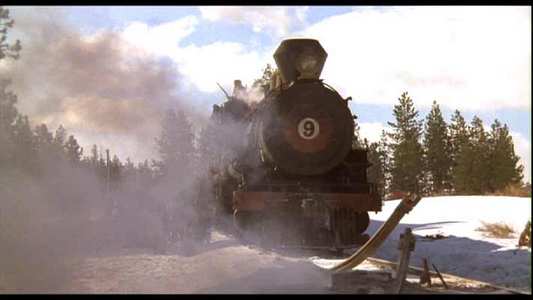
Video
Breakheart Pass comes with a 1.85:1 anamorphic transfer. The picture is grainy, dirty and dull. No attempt has been made to restore whatever print damage has occurred and specks of dirt and scratches are apparent throughout. There is also very little contrast, with a nighttime scene almost obscured. The whole look of the film is quite dull. For a western, the setting is quite dismal with no rolling plains or arid canyons, rather this is set during the wintertime in a conifer forest. While the story takes place in some spectacular scenery, that is all wasted by some uninspiring cinematography. The bulk of the film is studio bound, with only the external train scenes to liven things up. I guess such a closed and claustrophobic set was meant to inspire tension. It does the opposite and slows the pace of the story right down. This looks very much like a television drama of the period rather than a feature film. The effects are cheap, the same bridge is crossed three times, and there are some obvious continuity errors.
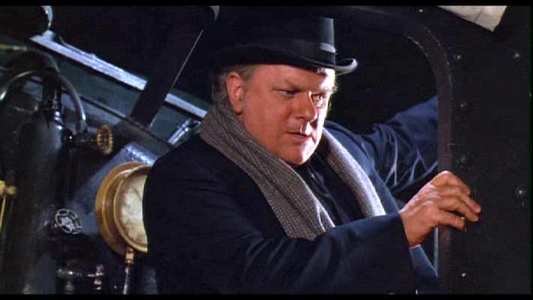
Audio
You get DD 2.0 soundtracks in English, French, German, Italian and Spanish as is usual with many MGM back titles. There are also subtitles in several languages. The dialogue is clear and audible throughout this film, but there aren`t really any moments deserving any special audio treatment. Jerry Goldsmith`s theme is impressive, reminiscent of all the best westerns, but the incidental music is monotonous and lifeless, which doesn`t help the pace of the movie any.
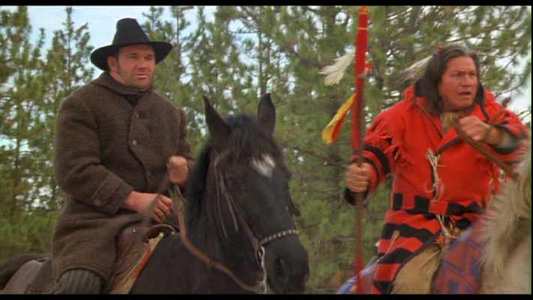
Features
There is an abysmal trailer. Abysmal in terms of film quality that is, it makes the main feature look pristine in comparison.
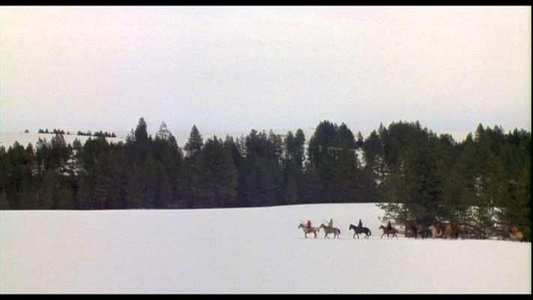
Conclusion
I like Westerns, I really do. Put me in front of a John Wayne movie and I`m happy for hours. For a good while, Westerns were a staple output from Hollywood and dominated American cinema for decades. But in the seventies the western began its decline, with mainstream movies being replaced by gimmicks like the comedy western, or concept movies that attempted to subvert the genre, like Butch Cassidy and the Sundance Kid, movies that bore no resemblance to the good ol` Cowboys and Indians of yore. This is in no way a bad thing, but with the gimmicks and experimentation comes a great deal of dross. And that is where Breakheart Pass comes in. Made in 1975, I guess the biggest draw was the Alistair MacLean story. Now Alistair MacLean and westerns do not make a lightning fast connection in my mind, and true to most expectations, Breakheart Pass bears little resemblance to a classic western. It starts off as a murder mystery on a train, and quickly becomes a sort of spy thriller. I got the feeling that the setting was incidental, and the story could have been told on the Orient Express, or any other railway. There really is nothing in this film that justifies the title, Western.
Then there is Charles Bronson as John Deakin. I have a great deal of respect for a lot of Charles Bronson`s movies, as long as they were made prior to 1970. Movies like The Great Escape, The Dirt Dozen, The Magnificent Seven and Once Upon A Time In The West showcase the best of Bronson`s talents. But some time in the seventies, he started making strange career choices. I`ve managed to steer clear of the Deathwish movies thus far, but it`s as if he lost all expressiveness in his face. In Breakheart Pass, no matter what the emotion, whether he is portraying happiness, elation, rage, anxiety or anguish, he keeps the same rigid, slightly constipated grimace, never varying the tone of his voice. Of course that gave hours of merriment when I last saw this film with my friends at university. But now, watching this in the solitude of my own living room, I could only lament the tedious pace and uninvolving performance from the lead character. Not even the presence of Western veteran Ben Johnson (not the Canadian sprinter, mind) as Marshall Pearce can rescue this film from mind-numbing monotony. The only highlight was the Indian Chief White Hand who I noticed was wearing a fetching red and black striped costume, Big Chief Dennis the Menace in other words.
Aside from a little excessive violence, this could be an afternoon movie on Channel 5. There really isn`t a lot that I can say to recommend this film. It`s not even bad enough to be funny. It`s dull and slightly below average, and I won`t be watching it again. (Not unless I`m drunk and want a giggle at `one face` Bronson)
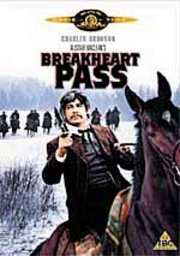




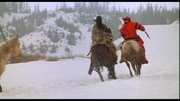
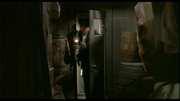
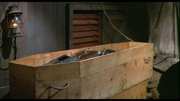
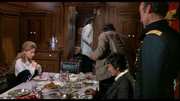
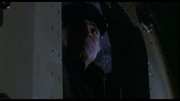
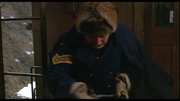
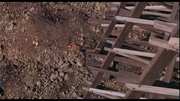
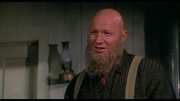
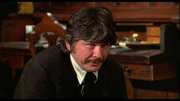
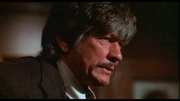
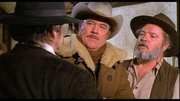
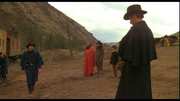
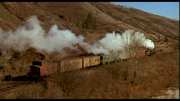
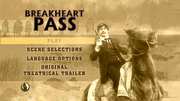
































Your Opinions and Comments
Be the first to post a comment!